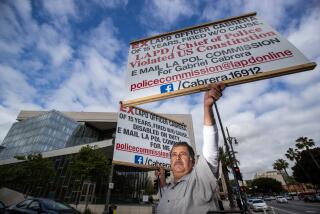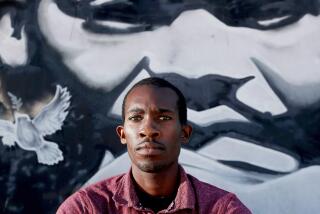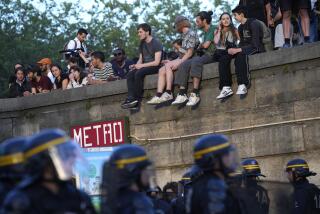Ferguson protests prove transformative for many
The photo, and the reaction to it, crystallized Ferguson’s uprising this month in all its anger and strangeness: a demonstrator in an American flag shirt, holding a bag of chips in one hand while hurling a canister of tear gas back at police with the other, leaving an arabesque of smoke in his wake.
The image became so well-known that a man who said he was the demonstrator put details for booking requests on his Twitter profile. He got thousands of new Twitter followers.
So too with Antonio French, a St. Louis alderman and budding celebrity, who in the space of 10 days gained more than 100,000 Twitter followers due to his relentless documenting of events good and bad after the police shooting of Michael Brown.
People are wondering what higher office French might seek. And they say as much about Missouri State Highway Patrol Capt. Ron Johnson, once a low-profile officer, placed in charge of maintaining security in Ferguson.
It’s become apparent that anyone who has played a contributing role in this city’s unsteady vortex has been reshaped in it.
Along with fostering celebrity, events here have taken on a ritualistic quality, with protesters gathering night after night along a small stretch of West Florissant Avenue.
“During the day, it’s a spectacle. At night, it’s a war zone,” Wes Suber, a 26-year-old sociology student from Ferguson, said one night this week.
There’s no one guiding events — Ferguson has been like a barreling train without an engineer — and the difficulties in organization were apparent. On Tuesday, community leaders halted a protest march to hold a prayer and lead some chants; they told demonstrators to go home and rest up for a protest outside the county justice building in nearby Clayton the next morning.
But the crowd refused to go home. Instead, people milled around until there was another standoff with police.
Akbar Muhammad, a leader with the Nation of Islam, this week conceded to reporters the challenge of maintaining control and focusing energy, saying, “We don’t have a playbook for this.” His group was trying to “mobilize the young men” who had claimed the streets at night, he said.
As always seems to happen with a big news event, the spotlight also has fallen, and not flatteringly, on the news media. Suber zeroed in on the national and global journalists who have descended on Ferguson to document the unrest, to the point that they have begun to outnumber demonstrators at the end of recent nights. Suber, with a black bandanna fixed around his neck, watched a gaggle of journalists pass.
“It’s embarrassing,” he said. “You’ll have six protesters in the street and 30 cameras.”
Complaints — sometimes shouted, sometimes murmured — have mounted recently over whether the focus on Brown’s death on Aug. 9 has been stolen by those hoping to draw the spotlight to themselves.
Many demonstrators and onlookers have hoped that the Ferguson uprising would be transformative not just for its participants, but for the nation.
Anthony Williams hopes for as much. Williams, a 60-year-old Lutheran pastor and journalist who traveled here from Chicago, reached back to a term from Greek antiquity to describe the potential of Ferguson — kairos.
The Greeks, Williams explained, had two words to reflect time. There’s chronos, the kind of time that can be measured in minutes or hours. Kairos, however, refers to a more important, transformative time.
“You have these moments in history where kairos time is speaking to us,” said Williams, with a camera around his neck, seeking to document what he hoped would be a nationwide tipping point in how the nation treats African Americans. “Ferguson is this kairos moment.”
Perhaps, he suggested, it would push America toward peace and civility.
Others have said as much.
“As Americans, we’ve got to use this moment to seek out our shared humanity that’s been laid bare by this moment,” President Obama said this week.
“What I’m seeing, hopefully, is a catalyst for change. Nothing wrong with protest. This country was founded on protest,” said St. Louis County Det. Kevin Bentley as he worked crowd control last week, sounding more like a demonstrator than a peace officer.
One demonstrator, Torraquai Walker, 36, of Ferguson, this week summed up the nights of peaceful demonstrations. “I love it,” Walker said. “This is the most unity I’ve seen in St. Louis in my adult life.... Everybody wants to be a part of it.”
Another demonstrator, Arshad Goods, 26, of University City, Mo., said, “It’s sad that somebody had to lose their life, but the dialogue that’s taking place is amazing.”
Yet another protester, China Hearns, 28, of Northwoods, Mo., reflected on what the weeks of protest meant.
“We all have a purpose in life,” she said, and maybe Michael Brown’s was to bring everyone together.
More to Read
Start your day right
Sign up for Essential California for news, features and recommendations from the L.A. Times and beyond in your inbox six days a week.
You may occasionally receive promotional content from the Los Angeles Times.







